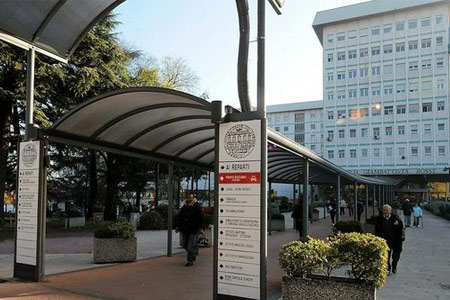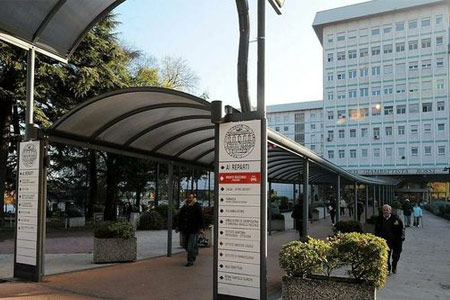- Authors:
-
Molinari, Chiara; Solaini, Leonardo; Rebuzzi, Francesca; Tedaldi, Gianluca; Angeli, Davide; Petracci, Elisabetta; Prascevic, Dusan; Ewald, Jan; Rahm, Erhard; Canale, Matteo; Martinelli, Giovanni; Tomezzoli, Anna; Bencivenga, Maria; Ambrosio, Maria Raffaella; Marrelli, Daniele; Morgagni, Paolo; Ercolani, Giorgio; Ulivi, Paola; Saragoni, Luca
- Title:
-
Genomic events stratifying prognosis of early gastric cancer
- Year:
-
2024
- Type of item:
-
Articolo in Rivista
- Tipologia ANVUR:
- Articolo su rivista
- Language:
-
Inglese
- Referee:
-
No
- Name of journal:
- Gastric Cancer
- ISSN of journal:
- 1436-3291
- N° Volume:
-
27
- Number or Folder:
-
6
- Page numbers:
-
1189-1200
- Keyword:
-
ARID1A; LRP1B; EGC; Pen; Prognosis
- Short description of contents:
- Background The purpose of the study was to conduct a comprehensive genomic characterization of gene alterations, microsatellite instability (MSI), and tumor mutational burden (TMB) in submucosal-penetrating (Pen) early gastric cancers (EGCs) with varying prognoses. Methods Samples from EGC patients undergoing surgery and with 10-year follow-up data available were collected. Tissue genomic alterations were characterized using Trusight Oncology panel (TSO500). Pathway instability (PI) scores for a selection of 218 GC-related pathways were calculated both for the present case series and EGCs from the TCGA cohort. Results Higher age and tumor location in the upper-middle tract are significantly associated with an increased hazard of relapse or death from any cause (p = 0.006 and p = 0.032). Even if not reaching a statistical significance, Pen A tumors more frequently present higher TMB values, higher frequency of MSI-subtypes and an overall increase in PI scores, along with an enrichment in immune pathways. ARID1A gene was observed to be significantly more frequently mutated in Pen A tumors (p = 0.006), as well as in patients with high TMB (p = 0.027). Tumors harboring LRP1B alterations seem to have a higher hazard of relapse or death from any cause (p = 0.089), being mutated mainly in relapsed patients (p = 0.093). Conclusions We found that the most aggressive subtype Pen A is characterized by a higher frequency of ARID1A mutations and a higher genetic instability, while LRP1B alterations seem to be related to a lower disease-free survival. Further investigations are needed to provide a rationale for the use of these markers to stratify prognosis in EGC patients.
- Product ID:
-
144860
- Handle IRIS:
-
11562/1158389
- Last Modified:
-
March 25, 2025
- Bibliographic citation:
-
Molinari, Chiara; Solaini, Leonardo; Rebuzzi, Francesca; Tedaldi, Gianluca; Angeli, Davide; Petracci, Elisabetta; Prascevic, Dusan; Ewald, Jan; Rahm, Erhard; Canale, Matteo; Martinelli, Giovanni; Tomezzoli, Anna; Bencivenga, Maria; Ambrosio, Maria Raffaella; Marrelli, Daniele; Morgagni, Paolo; Ercolani, Giorgio; Ulivi, Paola; Saragoni, Luca,
Genomic events stratifying prognosis of early gastric cancer
«Gastric Cancer»
, vol.
27
, n.
6
,
2024
,
pp. 1189-1200
Consulta la scheda completa presente nel
repository istituzionale della Ricerca di Ateneo 








